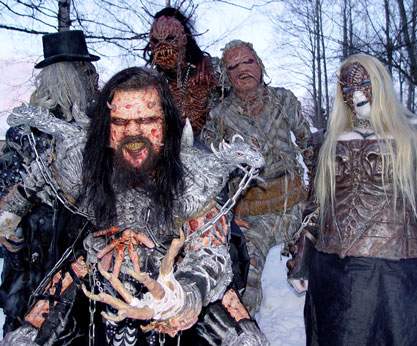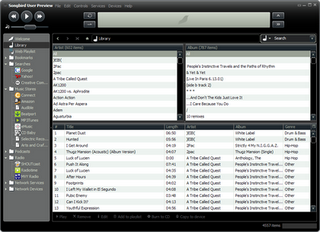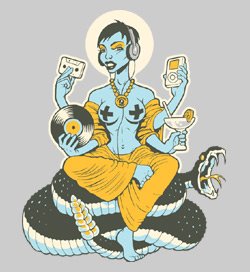Hola!
Aah, Sunday night, the most depressing part of the weekend. Eurovision is on the teev spewing forth some of the worst music every created. 'Created' doesn't quite seem to be the right word to use. 'Creative' is not the term I'd use for something which is birthed by committee to be as radio friendly as possible.
I have to say that I am mildly delighted by the winners though. The Finnish band, Lordi : Look at them! Looooooooooook at them! Marvel in their latex convered angst! Cower before their rubbery grimaces.
Look at them! Looooooooooook at them! Marvel in their latex convered angst! Cower before their rubbery grimaces.
This weekend has been very studious and healthy. I spent a couple of hours at work yesterday, which wasn't as bad as it sounds, I bought some new fish for my aquarium at work, I took in my aquarium testing stuff from home and balanced the water. I hope everything is not dead by the time I get in there 2moro.
I've been playing around a bit with Songbird, a music player/etc based on the Firefox browser. It's nowhere near complete yet, but worth having a look at. It looks like this:
Check out mojizu also, it's a cartoon character design community thing.
I got up early this morning and made damper, which, for a first attempt, was surprisingly good. I added saltanas to mine, one recipe I saw added corn. Kinda hard to fail at making a damper.
I've spent most of today studying asp.net 2.0. Interesting stuff.. I'm actually enjoying it.
To make sure we all start the week on a good note, please see below 70's tv commercial.
Laters peeps.
A future with no bananas??
Virtually all bananas traded internationally are of a single variety, the Cavendish, the genetic roots of which lie in India. Three years ago, New Scientist revealed that the world Cavendish crop was threatened by pandemics of diseases such as that caused by the black sigatoka fungus. The main hope for survival of the Cavendish lies in developing new hybrids resistant to the fungus, but this is a difficult and time-consuming task because the seedless modern fruit does not reproduce sexually and has to be bred from cuttings.
Now the UN Food and Agriculture Organization (FAO) has warned that wild banana species are rapidly going extinct as Indian forests are destroyed, while many traditional farmers' varieties are also disappearing. It could take a global effort to save the bananas' gene pool.
In fact many of the genes that could save the Cavendish may already have been lost, says NeBambi Lutaladio, a plant scientist at the FAO's headquarters in Rome, Italy. One variety that contains genes that resist black sigatoka survives as a single plant in the botanical gardens of Calcutta, he says.















